By Wickham Boyle
Tings Dey happen
Written, directed and performed by Dan Hoyle
Through Sept. 23
The Cutlure Project
55 Mercer Street NYC 10013
(212 925-1900; cultureproject.org)
I am well acquainted with the West Africa that Dan Hoyle portrays in his one-man show, “Tings Dey Happen,” now at the Culture Project. Based on the year he spent in Nigeria on a Fulbright scholarship, the show, in his own words, “is a distillation of the Niger Delta as I experienced it. Many of the characters are composites, the monologues a blend of several people’s words. Events continue to unfold in Nigeria.”
Yes, they do. Nigeria, since its independence from Britain in 1960, has been a focal point of both unrest, and a relentless quest for more and more oil largely used by the U.S. and Europe.
Here are some facts gleaned from the show: The Niger Delta provides Nigeria with three million barrels of oil per day and more than half of it is shipped to the U.S., making Nigeria the fifth largest supplier of American oil. In true Colonial fashion, the oil business is a joint venture between the Nigerian government and the oil makers with whom they contract: Shell, Chevron, Exxon, Agip and Elf. The split is a strait 60-40 percent. Currently the economy of Nigeria receives 80 percent of its revenue from oil royalties and taxes. This only serves to exacerbate a country known for aggressive haves and have-nots.
I was in Lagos, the capital of Nigeria in the early ’80s and my most blazing memory is of corpses littering the sides of the road. I was on my way to Niger, a country many Americans think is the same as Nigeria, but is most definitely not. I was appalled by the disregard for humanity and was told in no uncertain terms that my attitude was so American.
Dan Hoyle has taken his American eyes and regarded the complicated culture and economics in Nigeria today, but he has also provided visions, voices, accents and the lingo of the Nigerian people. A very white Danny Hoyle successfully occupies the personages of a Nigerian warlord, the American Ambassador, Scottish oil workers, and impoverished Nigerian slum dwellers, and make no mistake about it, Hoyle has done his homework and is a very talented mimic and actor.
That said, I was taken aback by the fact that once again a white man is telling someone else’s story. I was so upset by this that I stayed after the curtain dropped to accost the gorgeous, obviously African man sitting to my left. Was he a journalist? What did he think? Was he offended? In fact, Paul, a Nigerian investment banker from London, loved the piece and only wished there were more Nigerians in the audience so that there would be the laughter of knowing how well this story was told.
OK, but how about the empowerment involved in self-telling? I asked. “Well that would be better, but since Dan Hoyle is here and has the work so well done, my only criticism is that he needs to be in neighborhoods where many Africans can see this important work.” For his part, Paul said he was going to send out an email blast in an attempt to add color to the audience.
The evening does provide crucial information about the situation in Nigeria and the widening circle of pain and fear that the quest for oil inflicts worldwide. And Hoyle is one of the masters in the genre of one-man shows. However, there is a Kenyan proverb that says, “Until lions have historians, hunters will be heroes.” I agree that the Nigerian saga needs to be told, and perhaps, like the lions who have so few to tell their story, Dan Hoyle makes an excellent historian. But I still want to see more stories told in the voice of the lion.


































